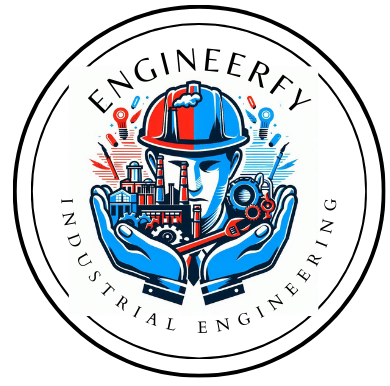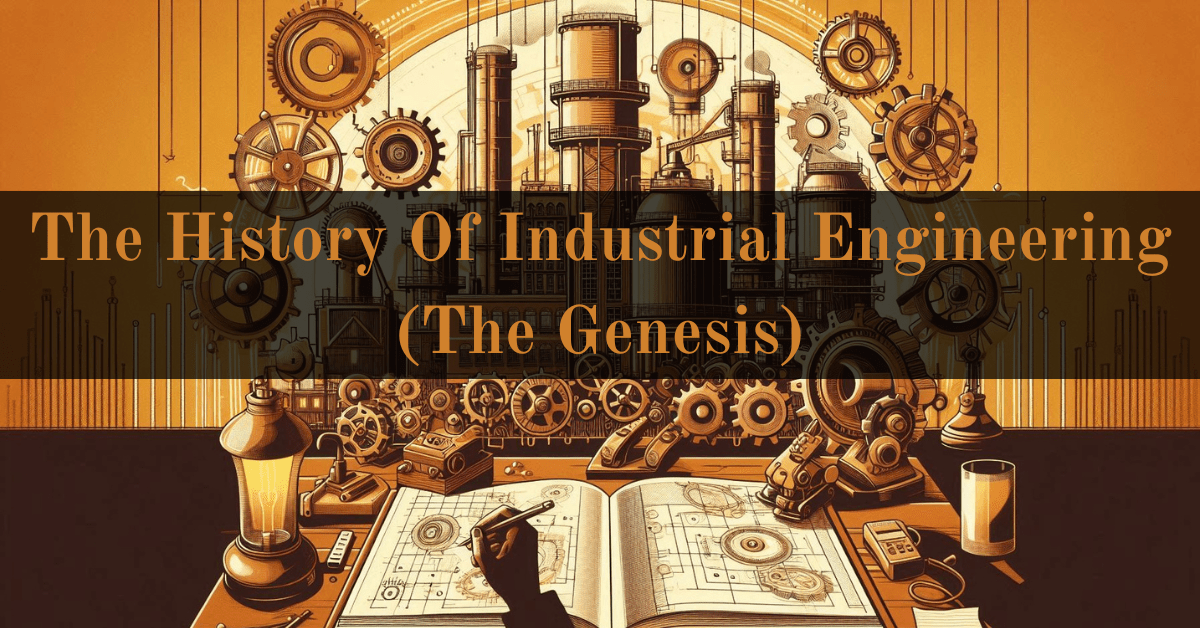My focus today is on the early chapters of Industrial Engineering, a discipline that, while perhaps less well-known than Civil and Mechanical Engineering, is critical to modern systems’ optimisation and efficiency.
At it is core, Industrial Engineering is about improving complex processes, systems, and organizations.
It is the art and science of fitting together the pieces of productivity puzzles to create a coherent and functional picture.
The origins of Industrial Engineering are as fascinating as the discipline itself, drawing a direct lineage from the catalytic era of the Industrial Revolution.
It was during this period that the foundations were set, as waves of innovation demanded structured approaches to manage production and labour.
Pioneers like Frederick Taylor and Frank and Lillian Gilbreth stand tall as the forebears of Industrial Engineering.
Taylor’s scientific management laid the groundwork for systematic productivity improvement, while the Gilbreths introduced motion study, which fine-tuned the efficiency of the human component in work processes.
The early 20th century bore witness to these methods transforming manufacturing floors and setting the stage for what would become a formalized field of study and practice.
By the mid-century, Industrial Engineering had grown from these roots to become a distinct and essential discipline, shaping not only manufacturing practices but also influencing labour relations and management philosophy.
Universities began to recognize the field, developing dedicated programs and degrees to equip new generations of engineers to carry the torch.
This foundational period set Industrial Engineering on a trajectory of growth that would lead it to play a vital role in the global landscape.
As the world stood on the precipice of further upheaval due to looming conflicts and the prospect of another technological leap, Industrial Engineering too was gearing up for its next great challenge.
The Expansion of Industrial Engineering: World Wars and Technological Advancements
The transformative power of global conflict reshaped Industrial Engineering from a field focused on individual productivity to one integral to national interests.
Two World Wars served as catalysts, transforming industries to meet the demands of large-scale production and logistics.
Industrial Engineers were at the forefront, tasked with optimizing workflows and material use to bolster war efforts.
A stark example was during World War II when Industrial Engineers designed complex manufacturing systems for weaponry and vehicles at unprecedented scales.
They streamlined production lines, reducing waste and maximizing output, a practice essential to the Allied victory.
The war also demanded that these professionals diversify their skills, encompassing not only manufacturing but also the intricate management of supply chains and logistics.
The post-war era welcomed a tidal wave of new technologies.
Industrial Engineers incorporated emerging computing power into their work, developing early versions of systems that would evolve into modern enterprise resource planning (ERP) systems.
New methodologies, such as Statistical Quality Control and Project Management techniques, took form, influenced by the efficiency necessities derived from wartime production.
Notably, the post-war period also witnessed the diversification of Industrial Engineering principles into sectors beyond manufacturing, such as healthcare, finance, and entertainment.
The adaptability of these principles proved essential as society demanded more complex services and goods.
This was also a time when systems engineering began to emerge as a distinct but related field.
It is focused on interdisciplinary approaches to complex systems and was inspired by the large-scale, integrated efforts Industrial Engineers had honed during the war.
Systems engineering continued to draw from and refashion Industrial Engineering’s core objective: to enhance efficiency wherever complex processes existed.
The Age of Optimization: Industrial Engineering in the Late 20th Century
Remarkable strides in efficiency and process optimization defined the later part of the 20th century for Industrial Engineering.
Operations research, a critical subset, merged mathematics and science to streamline decision-making in complex systems.
The introduction of computer systems forever changed the traditional Industrial Engineering landscape.
Computer-aided design (CAD) and computer-aided manufacturing (CAM) dramatically improved the accuracy and speed at which products could be designed, tested, and produced.
Industrial Engineers were at the forefront of lean manufacturing and Six Sigma methodologies, introducing them to reduce waste and variability in production.
These practices emphasized the importance of continuous improvement and became benchmarks for quality management.
Various industries experienced transformations due to Industrial Engineering, making for compelling case studies.
For example, the automotive sector greatly benefited from assembly line enhancements, significantly boosting productivity and worker safety.
The era’s advancements were not confined to manufacturing alone.
Service industries also witnessed substantial improvements in workflow and efficiency, largely thanks to Industrial Engineering insights.
The Current Landscape: Modern Developments and Challenges
Industrial Engineering has always adapted to the changing tides of technology. With the digital revolution, this field is seeing transformative shifts once again.
Gone are the days of Industrial Engineering being confined to assembly lines and factory settings.
Today, the discipline extends its prowess to complex digital systems and data-driven optimization, in industries as varied as healthcare, finance, and logistics.
Sustainability has emerged as a critical concern, and Industrial Engineers are at the forefront of designing eco-efficient processes.
Green engineering principles are increasingly becoming a standard part of the curriculum.
It is about minimizing waste and maximizing resource efficiency, not just to cut costs, but also to preserve our planet.
Artificial intelligence (AI) and machine learning (ML) are no longer buzzwords; they are tools that Industrial Engineers now must master.
They use AI to predict maintenance needs and ML to streamline supply chains.
These technologies are not just about automation but about making smarter decisions, enhancing the human element of engineering rather than replacing it.
In industries that must pivot rapidly, like tech and consumer goods, Industrial Engineers are the architects of agility.
They redesign processes to respond to market fluctuations and consumer demands.
This agility is turning out to be a competitive edge, helping companies thrive where others falter.
Lastly, the intricacies of global supply chains have brought on new challenges.
The pandemic showed us how vulnerable these networks can be.
Industrial Engineers are learning to build resilience into systems, ensuring they can withstand shocks, from natural disasters to geopolitical disputes.
This role is becoming ever more critical as our economies become increasingly interconnected.
Looking Ahead: The Future of Industrial Engineering
As I reflect on the journey of Industrial Engineering, it is essential to look to the horizon and imagine what lies ahead for this adaptable and critical field.
Industrial Engineers are poised to become key players in shaping Industry 4.0, where the integration of the Internet of Things (IoT), robotics, virtual reality, and advanced data analytics will transform how industries operate.
Global challenges such as climate change, renewable energy development, and water scarcity will demand innovative solutions that Industrial Engineers are uniquely qualified to provide.
These professionals will need to blend traditional engineering principles with next-generation technologies to create sustainable systems that prioritize both efficiency and environmental responsibility.
The educational paths for upcoming Industrial Engineers are also evolving.
Universities and technical institutes are now updating curricula to include advanced software competency, systems thinking, and a focus on sustainability.
The continuous learning model, necessitated by the ever-advancing technological landscape, will become a cornerstone of the profession.
Collaboration is set to take centre stage.
Industrial Engineers will increasingly work with professionals from various fields, including data science, logistics, and human resources, to devise comprehensive solutions to complex problems.
Their role in facilitating interdisciplinary knowledge will be vital in both industrial and service sectors.
Ultimately, Industrial Engineering will continue to be integral in designing the future of work.
As automation and artificial intelligence redefine jobs, Industrial Engineers will be needed to ensure optimal human-machine collaboration, safeguarding both productivity and workforce wellbeing.
The History Of Industrial Engineering – My Final Thought
In looking back at the evolution of Industrial Engineering over the years, it is clear that this field has played a crucial role in shaping the way businesses operate and thrive.
From it is origins in the early 20th century with the Scientific Management Principles of Frederick Taylor, to the advances in technology and automation seen today.
Industrial Engineering continues to be a driving force in improving efficiency, productivity, and overall organizational success.
As we move forward into the future, it will be fascinating to see how Industrial Engineering continues to innovate and adapt to meet the ever-changing needs of a global marketplace.
Therefore if you like what you read in this post please share it with others who would like to read this post and also leave a comment section.
Please support me with any donation to Paypal :franckchanda@gmail.com it helps with research and maintaining this website.
I really appreciate any help you can provide.

